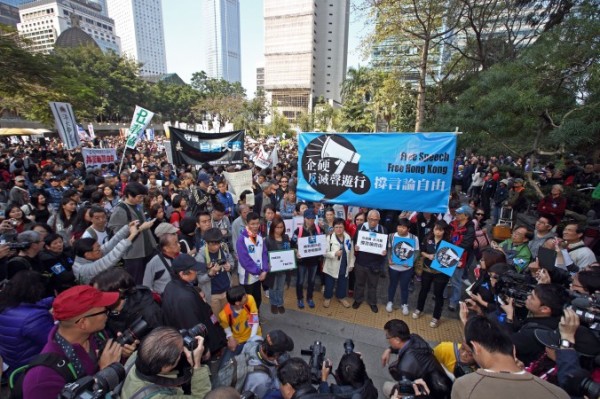Kevin Lau Chun-to, former Editor-in-Chief of Ming Pao, was brutally attacked in broad daylight on 26th February, 2014. He was stabbed 6 times and was rushed to hospital where he underwent several hours of surgery. This has provoked public concern for press freedom in Hong Kong, especially given that the perpetrators saw fit to inflict such ghastly vicious assault on a journalist known and respected for his moderate views, this is seen by some as an open challenge to the city’s rule of law.
That the attack on a journalist has taken place soon after the February 23 protest march concerning the safeguarding of press freedom in Hong Kong, is causing additional concern. Though the police believe the attackers were triads and could now be in the mainland.
This was no isolated case but is in the context of a series of worrying incidents involving the media over recent years.
Any underlying factor that brings in the imminent schedule and arrangements – so far undisclosed in any detail – for Hong Kong next Chief Executive and the question of universal suffrage is not likely any link to this crime. More reason for the attack lies in the direction of the journalist’s interest in high profile people’s corrupt business practices on the mainland. He was a member of a team researching this very hot topic.
However, there is a local history of political pressure being cited for impinging on media freedom, though case-by-case cannot be sure of reasons. For example, in May and July 2004, popular hosts of Commercial Radio, Albert Cheng King-hon and Wong Yuk-man, were forced to quit, and this duo cited political pressure.
Much more recently, in December 2011, Radio Television Hong Kong (RTHK) fired host Ng Chi-sum with similar complaints.
March 2012, Henry Tang Ying-yen accused Leung Chun-ying (now the Chief Executive) of suppressing freedom of speech in a public debate during the Chief Executive Election, claiming that Leung had proposed to shorten the license renewal term for Commercial Radio at a high-level government meeting during his tenure as an Executive Councillor.
In December 2012, Albert Cheng King-hon was again in trouble and forced to leave the Digital Broadcasting Corporation Hong Kong Ltd (DBC) due to so-called internal shareholder disputes.
June 2013, iSun Affairs publisher, Chen Ping, was assaulted after work and the same month Next Media Chief, Jimmy Lai Chee-ying ‘s home was attacked with the front gate rammed by a car; also, knife-wielding arsonists threatened workers and burnt 20,000 copies of Apple Daily.
July 2013, Shih Wing-ching, owner of AM730, was stopped in the middle of the road and his windshield was smashed with a hammer.
August 2013, an internal memo issued by the Central Party Office to China Communist Party’s cadres – referred to as Document No. 9, stated: “Western forces hostile to China and dissidents within the country are still constantly infiltrating the ideological sphere, creating unrest and aggravation against the Party and the government by raising provocative issues”.
September 2013, The House News’ network was invaded by hackers.
October 2013, Publisher Yao Wentian was detained in Shenzhen after being lured to the city. At the time of his arrest, he was preparing to publish a book by US-based dissident writer Yu Jie, entitled Chinese Godfather Xi Jinping.
Turning to the present year, in January the owner of the newspaper AM730, Shih Wing-Ching, revealed that Chinese companies withdrew million dollars worth of ads from his paper, bringing economic pressure to bear. In the same month the Editor-in-Chief of Ming Pao was suddenly abruptly replaced by a journalist from Malaysia
February and an outspoken Commercial Radio host, Li Wei-ling, was sacked, after having been warned by a C. Y. Leung aide to “careful you don’t lose your job”. And the latest problem for the media and in particular for journalism, when Kevin Lau, former Editor-in-Chief of Ming Pao, so recently removed from his editor role, was attacked, severely injured after being stabbed multiple times.
Further street demonstrations in support of Kevin Lau took place last Sunday, March 2, 2014, also making an outcry to safeguard press freedom. It was organized by the Press Coalition against Violence. Kevin Lau’s condition has improved from critical to stable.






